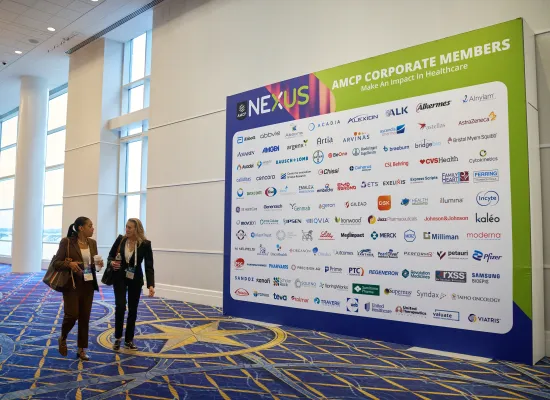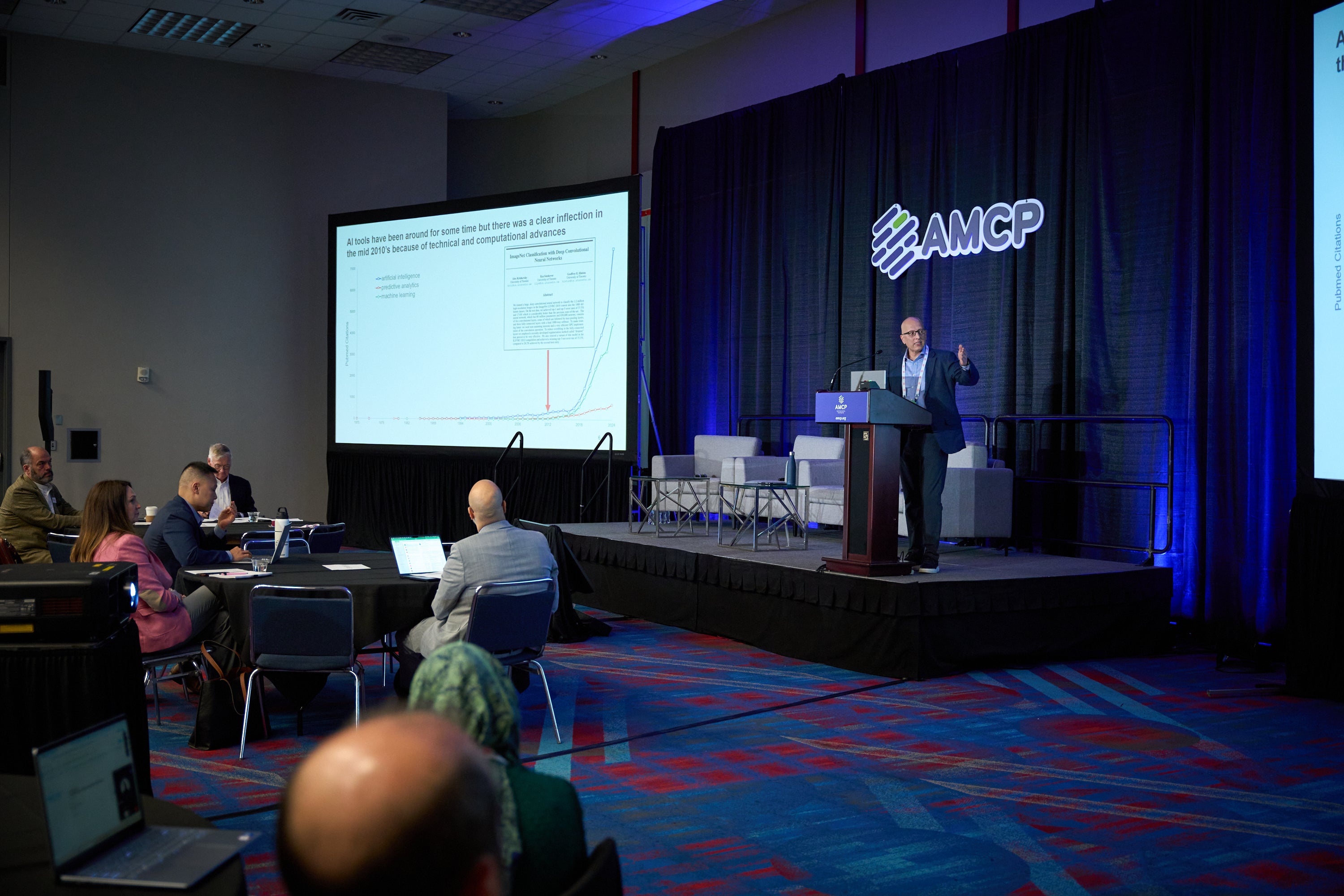
AI and the Future of Managed Care: Key Takeaways from AMCP's AI Pre-Conference

Artificial intelligence (AI) is no longer a future concept—it’s actively shaping how we work, make decisions, and deliver care across the managed care space. That momentum was on full display at AMCP’s recent AI Pre-Conference in Houston, Texas at AMCP 2025.
“Now is the pivotal moment for managed care pharmacists to lead the industry and make a lasting impact. The full room and engaged participation at the AMCP AI Pre-Conference underscore the readiness and enthusiasm for innovation. Together, we can drive transformative change in healthcare." - Joe Honcz, RPh, MBA
Four expert panels delivered a well-rounded view of AI's opportunities and challenges to managed care, covering clinical applications, regulatory challenges, patient engagement strategies, and ethical considerations.

Here’s what managed care professionals need to know.
AI Is Active, But Widespread Integration Still Has a Long Way to Go
Managed care professionals currently use AI to:
• Help streamline prior authorizations.
• Optimize formulary designs.
• Identify high-risk patients for intervention.
These AI tools show the immediate potential to reduce administrative burden, improve efficiency, and support better patient outcomes, however, challenges like data silos, interoperability issues, and uneven adoption of AI technology are still roadblocks to full integration.
Governance and Oversight: The Pillars of AI Progress
Responsible AI use requires more than advanced technology; it requires thoughtful governance. Managed care professionals are seeking clear guidelines on things such as liability in AI-influenced decisions, long-term performance evaluation, and the evolution of regulatory frameworks to ensure AI's safe, compliant, and responsible implementation.
“We are witnessing the rapid emergence and adoption of new technologies that are transforming the way we practice, learn, and communicate. Artificial intelligence, immersive hardware and software, automation, and smart devices are some of the examples of technology that are enhancing our capabilities, expanding our scope, and creating new possibilities for pharmacy.” – Jeff Mesaros, PharmD, JD, MS
Education: The Key to Bridging the Gap in AI Innovation
The AI Pre-Conference revealed a clear gap: while interest in AI is high, many professionals feel unprepared to engage with or utilize the technology to its full potential. This highlights the urgent need for role-specific, practical training tailored to managed care to bridge this gap.
Practical Applications Are Not Just Driving Interest, But Also Inspiring Innovation
Rather than just high-level theory or a 30,000-foot view of AI, what truly resonated with attendees were the practical use cases showing AI in action and what the applicability and versatility of use in managed care looks like. Sponsors and panelists shared the diverse ways AI can help reduce administrative burden, with examples such as the use of citizen bots to process and clear work queues or automatically retrieve reports.Other AI tools can improve medication adherence by providing personalized reminders and support to patients, and aid in better outcomes tracking in value-based contracts.
"AI is not magic—it won’t fix your problems for you. But it will help you solve them better, faster, and smarter than you could alone." – Linea Wilson, MBA, CFHP
Ethics, Equity, and Human Oversight: Essential Components of the AI Conversation
As AI becomes more entrenched and commonplace in healthcare, managed care professionals are already thinking past the technology and asking more questions about the broader impact of utilization. Questions and insights about data quality, bias, and AI's potential to unintentionally widen health disparities were heard during many of the panels. As AI tools become more accepted in managed care decision-making and operations, there’s a need to keep clinical judgment and patient-centered care front and center. The closing panel focused entirely on ethical and regulatory considerations, reinforcing the need for guardrails, human oversight, and equity-focused design to help address these concerns.
“With the emergence of AI agents, we are quickly moving to a world of 'biologic workers' and 'digital workers'. Are we ready for a world where AI will be continually pushing us to justify the value of ‘biologic workers’?” – Harry Travis, RPh, MBA
"My excitement about AI stems less from its power to optimize systems and more from its potential to compel a re-evaluation of what we fundamentally value. As machines increasingly handle the quantifiable and the routine, we are presented with a unique opportunity – perhaps even an imperative – to rediscover and elevate the profoundly human contributions people bring to their work." – Justin Bioc, PharmD, BCPS, BCGP, RPh
What’s Next for AMCP and the Managed Care Community
In the coming months, AMCP will launch a new AI Interest Group to allow members to connect, collaborate, and build resources that explore governance and policy, education, clinical use cases, and more.
In addition, AMCP will develop new educational opportunities, curate tools and resources, and help AMCP members understand how to evaluate and implement AI solutions thoughtfully.
How You Can Get Involved
Whether you’re just beginning your AI journey or already piloting tools within your organization, the AI interest group will offer a space to connect with peers, share experiences, and lead industry progress in shaping the future of AI in managed care pharmacy.

Jillian Davis, PMP, CPhT
Senior Manager, Practice Strategy and Innovation
Related Resources:
- Webinar: AI and Aging: Implementing New Technology to Optimize Outcomes
- Initiative Page: AI in Managed Care Pharmacy: Leading with Integrity, Innovation & Impact
- AMCP NewsBreak: HHS Issued Strategic Plan for the Use of Artificial Intelligence in Health, Human Services, and Public Health (Members Only)
Featured News & Resources
See Full CalendarAward Applications Open
AMCP eLearning Day: Nexus Encore
AMCP 2026 Registration Opens
Upcoming Events
AMCP offers a wide variety of educational opportunities, from events and webinars to online training.







